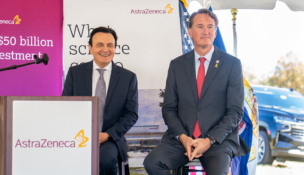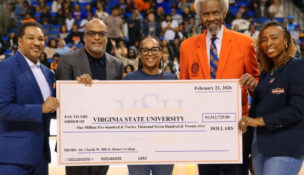Booz Allen to pay $15.8M fine to settle fraud allegations
BES subsidiary is accused of violating False Claims Act
Kate Andrews //January 6, 2025//

The U.S. Department of Justice. Photo: AdobeStock

The U.S. Department of Justice. Photo: AdobeStock
Booz Allen to pay $15.8M fine to settle fraud allegations
BES subsidiary is accused of violating False Claims Act
Kate Andrews //January 6, 2025//
Booz Allen Hamilton, the McLean-based Fortune 500 global management consultant, has agreed to pay a $15.875 million fine to the federal government to settle allegations that one of its subsidiaries violated the False Claims Act, the Department of Justice announced Jan. 3.
According to the DOJ’s statement, two former program managers at Maryland-based Booz Allen Hamilton Engineering Services (BES), John G. Hancock and Karen K. Paulsen, “knowingly engaged in a fraudulent course of conduct” with a civilian Air Force employee, Keith A. Seguin, and a BES subcontractor, David J. Bolduc Jr. of Ashburn-based software engineering company QuantaDyn Corp., to win a General Services Administration task order to test military training simulators.
In 2023, Bolduc, who was a co-owner and director of operations at QuantaDyn, was sentenced to 120 months in prison for one count of conspiracy to commit wire fraud. According to the Justice Department, from 2007 to 2018, Bolduc and others paid $2.3 million in bribes to Seguin in return for his assistance in obtaining government contracts and subcontracts for QuantaDyn. Hancock was sentenced to 40 months in prison for one count of conspiracy to commit wire fraud, and Paulsen was sentenced to five years of probation. Seguin, a Texas resident, was sentenced to 188 months in prison for wire fraud and tax fraud in 2023.
“The government alleges that Seguin improperly and illegally divulged confidential government contracting and budget information, a competitor’s confidential bid or proposal information and source selection information to Hancock and Paulsen, who used the illicit information despite knowing they were not authorized to possess it,” the DOJ announcement read.
After the GSA awarded the task order to BES, the government alleges that the four people used confidential federal budget information to submit price quotes to GSA for 37 individual modules, which BES awarded to QuantaDyn and were paid by GSA.
“Over the past several years, my office has used every tool at its disposal — from civil settlements to criminal prosecution to asset forfeiture — to hold accountable the companies and individuals that helped a corrupt federal employee at Randolph Air Force Base defraud the United States by steering training simulator contracts,” U.S. Attorney Jaime Esparza for the Western District of Texas said in a statement. “I am grateful for the assistance of the Department of Justice’s Civil Division and our law enforcement partners in finally closing the book on this fraud scheme with the civil settlement announced today.”
Booz Allen said in a statement Monday that the company denies violating the False Claims Act.
“This settlement resolves a civil matter involving the conduct of three former employees shortly after Booz Allen acquired their company from ARINC and formed the Booz Allen Engineering Services (BES) subsidiary in 2012,” the company said in a statement. “There are no findings or admissions of wrongdoing on the part of Booz Allen. The conduct described in the settlement largely occurred before the company was acquired by Booz Allen.”
In November 2012, Booz Allen purchased ARINC’s defense systems engineering and support division for $154 million, which it integrated as BES.
“Booz Allen raised concerns to the government prior to learning about the investigation and subsequently fully cooperated in resolving the matter. As acknowledged by the government in its investigation, the individuals involved in this matter admitted to taking deliberate steps to hide their conduct from the company because they would have been promptly terminated. We categorically deny that the company violated the False Claims Act and are pleased to move beyond this decade-old matter.”
In 2020, the DOJ entered into a civil settlement agreement with QuantaDyn and its majority owner, president and CEO, William T. Dunn Jr. In that agreement, QuantaDyn agreed to pay $37.75 million in restitution, and Dunn paid $500,000 to resolve his False Claims Act liability.
s

















